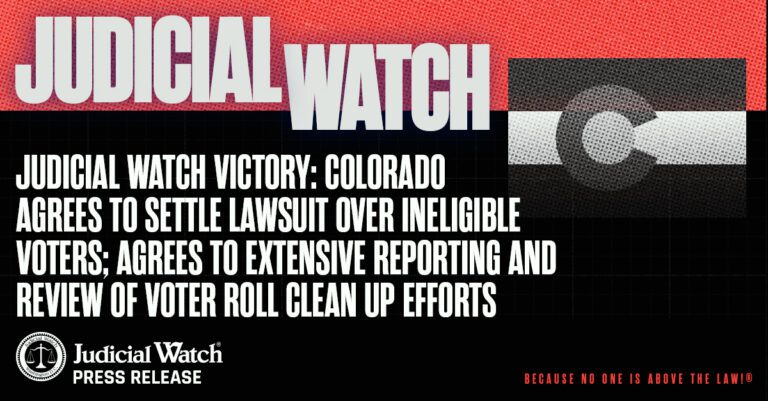
Judicial Watch Victory: Colorado Agrees to Settle Lawsuit over Ineligible Voters; Agrees to Extensive Reporting and Review of Voter Roll Clean Up Efforts

(Washington, DC) – Judicial Watch announced today that Colorado’s secretary of state agreed to settle a lawsuit alleging that Colorado failed to remove ineligible voters from its rolls. As part of its settlement Colorado will report to Judicial Watch on its yearly progress in cleaning up its rolls for the next six years. Since Judicial Watch filed its lawsuit, Colorado voter roll removals increased by 78%, from 172,379 to 306,303 per reporting period.
Judicial Watch filed the lawsuit in October 2020, in the U.S. District Court for the District of Colorado on behalf of itself and three residents of Colorado, alleging that the state had failed to clean its voter rolls as required by the National Voter Registration Act of 1993 (NVRA) (Judicial Watch, Inc. v. Griswold, et al.(No. 20-cv-02992)). In August 2021, the court ruled that Judicial Watch’s lawsuit could proceed. Judicial Watch was later joined in its lawsuit by the American Constitution Party of Colorado and the Libertarian Party of Colorado.
The lawsuit alleged that high registration rates and other voter roll metrics “indicate an ongoing, systemic problem with Colorado’s voter list maintenance efforts.” Judicial Watch sought a court order declaring that Colorado and its secretary of state violated the NVRA and ordering them to “develop and implement a general program that makes a reasonable effort to remove the registrations of ineligible registrants from the voter rolls in Colorado.”
The number of outdated registrations removed by Colorado under a key NVRA provision increased after Judicial Watch filed suit, from 172,379 registrations for the reporting period ending in 2018 to 306,303 registrations for the period ending in 2022—an increase of 78%. The settlement agreement requires Colorado to provide Judicial Watch its most recent voter roll data for each Colorado county each year for six years. This data is to include:
- The total number of registered and eligible voters, active voters, and inactive voters.
- The total number of address confirmation notices sent to Colorado voters pursuant to the NVRA, the number received back confirming or changing an address, and the number that were undeliverable or not returned.
- The total number of registrations addresses removed pursuant to key provisions of the NVRA.
“Coming on the heels of a massive voter roll clean up in Colorado thanks to our lawsuit, this settlement agreement is a major victory for all Colorado voters,” Judicial Watch President Tom Fitton said. “Simply put: Cleaner voter rolls mean cleaner elections.”
Judicial Watch is a national leader in voting integrity and voting rights. As part of its work, Judicial Watch assembled a team of highly experienced voting rights attorneys who stopped discriminatory elections in Hawaii, and cleaned up voter rolls in California, Ohio, Indiana, and Kentucky, among other achievements.
In April 2019, Los Angeles County confirmed removal of 1,207,613 ineligible voters from its rolls since last year under the terms of a settlement agreement in a federal lawsuit that Judicial Watch filed in 2017.
Judicial Watch settled a federal election integrity lawsuit against New York City after the city removed 441,083 ineligible names from the voter rolls and promised to take reasonable steps going forward to clean its voter registration lists.
Kentucky also removed hundreds of thousands of old registrations after it entered into a consent decree to end another Judicial Watch lawsuit.
In February 2022, Judicial Watch settled a voter roll clean-up lawsuit against North Carolina and two of its counties after North Carolina removed over 430,000 inactive registrations from its voter rolls.
In March 2022, a Maryland court ruled in favor of Judicial Watch’s challenge to the Democratic state legislature’s “extreme” congressional gerrymander.
In May 2022, Judicial Watch sued Illinois on behalf of Congressman Mike Bost and two other registered Illinois voters to stop state election officials from extending Election Day for 14 days beyond the date established by federal law.
Robert Popper, a Judicial Watch senior attorney, leads its election law program. Popper was previously in the Voting Section of the Civil Rights Division of the Justice Department, where he managed voting rights investigations, litigations, consent decrees, and settlements in dozens of states.
###















